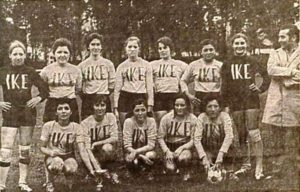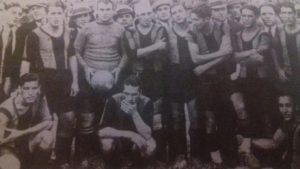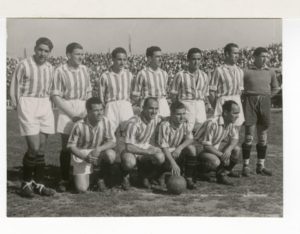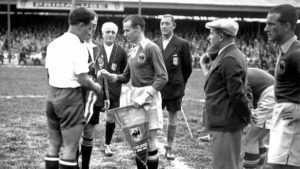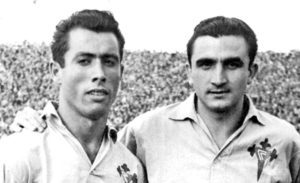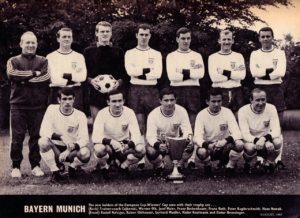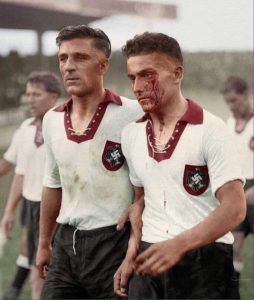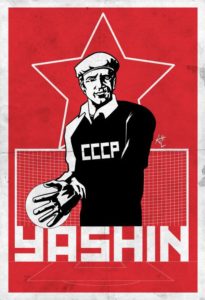The first women managers of Spanish football
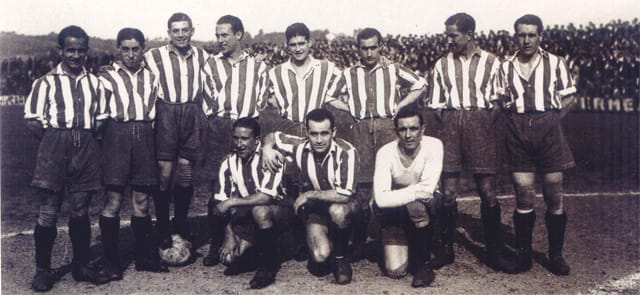
Last update March 8, 2020 by Javier Argudo
Failure to have taken part in the first championship of First Division 1928 and professionalization of the players, plunged the Real Sporting Gijon in a serious economic crisis despite the proceeds from the celebration of the international match against Italy. In June 1930, the Ateneo Obrero de Gijón hosts a general meeting of members and there, initiative of Ismael Figaredo, Auxiliary creation Sporting Group is approved, the G.A.S., a group of twenty-five members who are in charge of club management and search, parallel, new revenue.
In front of the steering group put the club Garnung Pedro Portilla, Juanes Enrique Gallego Y Sergio Villaverde Lavandera. To become part of it is essential to be a member of the club and provide 25 pesetas. The 5 of November 1933, it is agreed to renew and expand the share of contribution to 1.000 pesetas per member. The Sporting It has a debt to close 200.000 pesetas and an uncertain future. In that year, three women join the working group G.A.S.: Hulton innocence, Herminia Rodriguez Y Maria Elvira Sampil Moran.
THE SPANISH FOOTBALL THE PIONEERS
Until that year only Real Madrid (then those Madrid F.C.) and the F.C. Barcelona They had told a woman in her directive. In 1924 He was appointed as "female voice" to Josefa ass with the task of promoting women's sport and Real Madrid among women, so does the Catalan club with the versatile athlete Ana Maria Martinez in 1928, which it happens to take care of the few female sections of the club. In the year 1934, Barca voice full names to treat all kinds of issues relating to the athlete and Sporting Gijon directives also appoint full, with the position of vowels, the three women already mentioned. Son, so, pioneers in Spanish football.
Ino Hulton It was an extremely active person in gijonesa social life of the period. He had organized raffles for disadvantaged families in the city, always with the help of his uncle Hulton Federico González-Posada, who was secretary of the Board of the Port of Gijón. Port employees and abundant traffic of people lined the harbor a selling point for noble juicy interests Ino Hulton and yours.
The 3 April 1931 He had organized, involved in the representation, the play "The pin" of Pedro Muñoz Seca. For this purpose, He had had the help of journalist Vicente Innerarity and Councilman Celebration Felix Guisasola. They had opened the doors of the consistory and gijonés, with that, the help of Mayor Claudio Vereterra and his successor, Isidro del Río. For the performance of the play they had also enlisted the help owner Dindurra Theater, Manuel Sánchez Dindurra, alquilándoles local at a price much lower than usual.
City Hall ran the costs of advertising signage. Ino Hulton, along with his brother Anselmo and Andres Monreal, They managed to raise, after deducting expenses, near 3.495,30 pesetas. The amount was remarkable for its time, especially when we compared to the amount collected simultaneously for the same purpose by the local fire department, barely reached 300 pesetas. A) Yes, with successful experiences in the past and because of the huge economic crisis that choked the club, Hulton propone, with the support of her colleagues, conduct a series of activities to get money was needed urgently to address at least the season.
verbenas organized in the Japanese salon, classroom parties Richmond Coffee, who was a famous locally for its extensive menu of cocktails English were the delight, especially, young Gijón, novillada help the club in the Plaza de El Bibio, and a risky proposal, At first, He not had the support of the entire management: perform a play.
With the support of Ismael Figaredo, the proposal of Ino Hulton It is carried out with the approval and, shortly before his death, which was Dindurra theater owner, Manuel Sánchez Dindurra. The play, "Don Juan Tenorio", It is represented by gijoneses and none of them is an actor: the Hulton itself plays the role of Doña Inés and footballer Ramon Herrera, the Don Juan, Felix Rotaeta plays Don Luis and Patricio Rubiera, sportinguista front, It does the same in the case of Ciutti.
The theatrical performance is a success and two hundred thousand available tickets sold and is an important cash injection for the club. Although debt is still very high, It helps cover the budget of the season, to such an extent, the club creates a technical committee consisting of three illustrious former players (Manolo Meany Valle, Emilio Morán García Vigil and Baldomero Bango) in order to seek cheap signings that could pay Sporting and find among the youth of the youth players eligible to play matches with the first team.
THE SIGNING OF MANUEL Chorens
The existing box did not allow for much and lack of money prevented the Sporting sign that year, except the arrival of nationalized Cuban Galician Corens, He not even get to make debut nor minimally adapt to the club. Manuel Chorens, Born in La Coruna, but living in Cuba since childhood, He got to play with the Cuban team's World Cup in France 1938, Captain exercising in the three games that played.
It was left back and was international in Cuba in thirty-two times. The Spanish-Cuban arrived in Gijon, from Havana, the 31 of January of 1934 in the transatlantic Christopher Columbus, signed for Sporting the same day of arrival. In March he left the club without having played a single minute and the controversy generated by some unfortunate words in an interview with sports daily As. After his failure in Gijon fichando returned to Cuba again by the Galician Center of Havana, his club of origin.
Economic problems affecting, well, to sporting and only had fifteen professional footballers (sixteen if we include the short stay of unprecedented defense of the Caribbean country) and the rest of the workforce was covered with players from teams affiliated to reach twenty-used throughout the season. Nine players had subsidiaries option to play a game this season in the first team. But the first major sporting failure was not the most important in a Sporting beset by serious economic problems and, the 12 July 1934, one day before the representation of the play devised by Ino Hulton, but as with all the "paper" sold out for weeks, Elections were held in the club.
For the first time, rojiblancas members had the right to vote and were beginning to be a percentage, although minority, sportinguista significant in the social mass and increasingly taking a greater role. Elections are won by the candidacy of Emilio Tuya who decided to incorporate both those that had contributed, Ino Hulton, Herminia Rodriguez and Elvira Sampil, as members of its board. They were elected as vice presidents Alfonso Albo and Felix Guisasola, José Ramón Lueje was chosen secretary, Emilio Suarez did as treasurer, Luis Alvarez as an accountant and Jesus de la Torre, Dionisio Nespral, Francisco Quirós, Ulpiano Vigil-Staircase, Benigno Morán, Fernando Villaverde, Emilio Moran and Rafael Fuente completed the vocal quality directive.
For the first time some women entered the directive Real Sporting Gijon, the most important club of Asturias with a social mass that reached 2200 partners in 1936. With the almost total break that had the club during the period of the Civil War, with the exception of some training and a match played by the team rojiblanco subsidiary, in Olympia, normal in football was recovered at the end of this.
The Sporting dispute their first match against CP La Felguera one 8 October 1939. The 30 of January of 1940, and by order of the new local authorities, an extraordinary meeting is held in the cafe Dindurra, Local grandfather once owned the legendary footballer Cholo Dindurra. There, It is completely ceases to Emilio Tuya policy and government officials in Asturias appoint a new Felgueroso chaired by Secundino Fernández-Nespral, leaning against the vice presidency by Dionisio Nespral, Roberto Vega in the office of secretary and treasurer Alejandro Roces. We had to wait until 20 November 1989, the day of the elections in which Guerrero won Plácido Rodríguez (with 77'82% of the votes) Jose Luis Hevia Junquera, for another woman again occupy a position of responsibility in the club. Margarita Diaz Brana was named treasurer of that new board.

